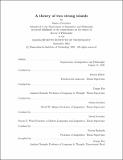A theory of two strong islands
Author(s)
Privoznov, Dmitry
DownloadThesis PDF (844.1Kb)
Advisor
Elliott, Patrick
Fox, Danny
Iatridou, Sabine
Pesetsky, David
Richards, Norvin
Terms of use
Metadata
Show full item recordAbstract
This thesis is dedicated to two strong island effects: The Subject Condition and The Adjunct Condition. Both effects can be unified under a single generalization, known as Condition on Extraction Domain, or CED (Cattell, 1976; Kayne, 1981; Huang, 1982): any maximal projection that is merged with a phrase is an island.
The thesis develops the so-called Spell Out theory, based on the original proposal by Johnson (2003). This theory derives CED from two basic assumptions about when and to which constituent Spell Out is applied over the course of syntactic derivation. The assumptions are, first, that between any two phrasal sisters at least one must be spelled out, and second, that a spelled out phrase does not project its category. The thesis also offers a theory of the interaction between syntactic derivation and memory structure that derives these two assumptions. The core principle is that focus of attention can only hold one element at a time.
The thesis examines three main predictions of the Spell Out theory. The first prediction is the Adjunct Condition. The thesis shows that adjuncts may sometimes be transparent, but only if their sister is opaque. The second prediction is the Subject Condition. The thesis argues that any extraction out of subjects either involves extraction out of complements (not specifiers) or covert pied-piping. The third and new prediction is that all specifiers and all adjuncts are interpreted by the LF interface before their sister, that is, they create the local context for their sister, as is evident from the behavior of discourse anaphora (the so-called Island Condition).
Date issued
2021-09Department
Massachusetts Institute of Technology. Department of Linguistics and PhilosophyPublisher
Massachusetts Institute of Technology